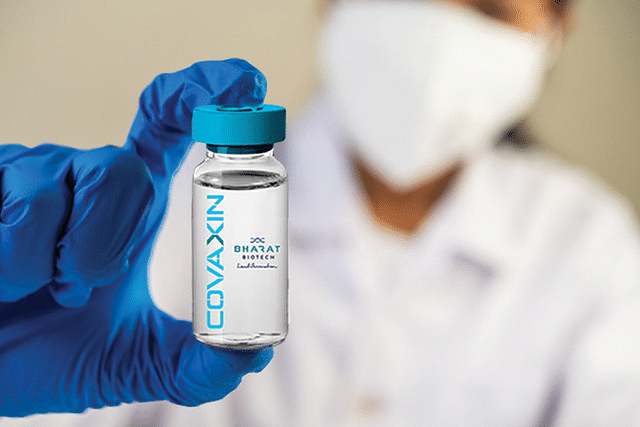
How Bharat Biotech Plans To Overcome Production Challenges Due To Export Restrictions On Raw Materials By US
Bharat Biotech is preparing to increase vaccine production from its Bengaluru-based facility, even as it faces challenges in sourcing raw material to ramp up production.
Made-in-India Covid-19 vaccine Covaxin uses Kansas-based ViroVax’s Alhydroxiquim-II adjuvant which boosts immune response and provides longer-lasting immunity.
But according to a new report, the Hyderabad-based company Bharat Biotech, the producer of Covaxin is facing challenges in producing this adjuvant.
This unexpected situation could hamper the vaccine maker’s plan to ramp up its capacity for Covaxin from the current 5 million doses each month to 12 million doses per month by July 2021.
Bharat Biotech is currently preparing to increase the vaccine production from its Bengaluru-based facility, which was set up to produce vaccines for animals.
A senior government official earlier said that the vaccines for animals are not the immediate priority as the company wants to utilise the Bengaluru facility to boost the Covaxin production.
Covaxin And Alhydroxiquim-II Adjuvant
The homegrown Covid-19 jab is an inactivated vaccine derived from a strain of novel coronavirus isolated at the National Institute of Virology (NIV), Pune.
The inactivated virus is formulated with the adjuvant to produce Covaxin.
The adjuvant puts a ‘red flag’ on the vaccine’s antigenic component — an inactivated partial or entire part of a virus or bacteria — and prepares the immune system to build up a defence against the antigen whenever it is encountered.
A source told Business Standard: “One of the reasons for the sluggish pace of the Covaxin production scale-up is the firm facing issues in sourcing the adjuvant from the United States.”
If there is a shortage of raw materials such as filters and bags, one can try to develop another vendor, but for chemicals as critical as adjuvants, the same formula cannot be applied, said the source.
“The vaccine, which is tested on volunteers and gets approved, is made with this adjuvant. Therefore, any change to this would lead to fresh clinical trials and fresh approvals,” the source further added.
According to Bharat Biotech chairman and managing director Krishna Ella, the aluminium hydroxide adjuvant, widely used in the development of Covid-19 vaccines, is known to induce Th2-based response which plays a key role in terms of eradication of extracellular parasites and bacterial infection.
He earlier explained that this Th2-based response has a theoretical risk of vaccine-associated enhanced respiratory diseases also called VAERD or ADE.
So, Bharat Biotech has used the Imidazoquinoline class of adjuvants (TLR7/8 agonists), which are known to induce Th1-based response that reduces the risk of Anti-Body Dependent Enhancement (ADE).
Shortage Of Raw Materials
Ella had said that many raw materials were imported to develop the vaccines, including preservatives for vaccines that are imported from Germany.
This is because India is not self-reliant in some of these raw materials required for the vaccine, said Ella.
However, in March the Hyderabad firm announced that it will work with the Council of Scientific and Industrial Research (CSIR) to develop technologies and platforms for novel vaccines, drugs and even raw material.
Even Adar Poonawalla, the chief executive officer of Serum Institute of India (SII) said that the shortage of raw material needed for vaccines was holding back the production scale-up of the Novavax.
While SII’s agreement with Novavax says that the company was to produce 1 billion doses this year, the shortage in raw material has halved its capacity for now.
As reported, a spokesperson from Novavax said that it has to delay the efforts to boost the production target of 150 million Covid-19 vaccine doses per month until the third quarter because of supply shortages including bags used to grow cells.
Poonawalla said: “Stockpiling of Novavax will happen to the tune of 50 per cent more if we have access to US raw material. The US has invoked the Defense Act and banned the export of raw material. This is as good as banning the vaccines.”
The SII, which partnered with British-Swedish pharmaceutical company AstraZeneca to manufacture Covishield is currently trying to develop new vendors for raw material which it imports from the US, such as filters, bags, cell culture media and others.
As of now, India has approved three vaccines; Covaxin, Covishield and Sputnik V. In the case of other vaccines, American pharma giants Pfizer and Johnson & Johnson could be among the potential gainers from the government's decision to fast-track approvals for other jabs authorised by major global regulators.